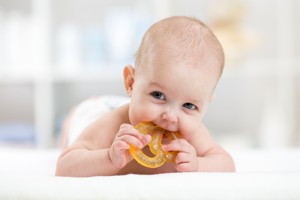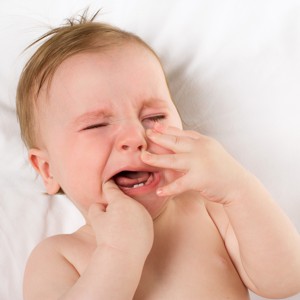 “He’s probably just teething” are words that you will hear a lot as a parent when you talk about your concerns regarding your baby’s health or behaviour. That’s because there are so many symptoms that are associated with teething, although not all of them have been proven to be linked.
“He’s probably just teething” are words that you will hear a lot as a parent when you talk about your concerns regarding your baby’s health or behaviour. That’s because there are so many symptoms that are associated with teething, although not all of them have been proven to be linked.
Read on to find out more about the signs and symptoms of teething, including those that are accepted by experts, and those that are reported by parents from up and down the country.
When Will My Baby Start Teething?
When your child is born, the chances are that he or she will not have any teeth, although it’s not impossible for your baby to be born with their first teeth already through. For most babies, teeth will start to make an appearance when they are around six months old, though every child is different and some will be earlier, others later. The first teeth to appear are usually the bottom front teeth (incisors) followed by the top front teeth a couple of months later. The lateral incisors, those teeth either side of the two front teeth both at the top and the bottom, will generally make an appearance another two months later, when your baby is around 10 months old.
Molars (back teeth) take a bit longer to make an appearance, as do canines, and you can expect your child to have all 20 of their milk teeth by the time he or she is around two and a half years old.
Whilst this seems fairly straight-forward, it’s worth noting that some babies will start showing symptoms of teething long before a tooth makes an appearance. In fact, some parents report that their child was showing signs of teething two or three months before the tooth was visible. The process is far from quick, and can be difficult for both the baby and the parent.
What Are The Signs & Symptoms Of Teething
 If you are one of the lucky few, then you may have a child who exhibits no discomfort whatsoever during teething, and those lovely pearly whites simply magically appear one day. Sadly, this is not the case for most babies, and teething can mean weeks of sleepless nights and discomfort.
If you are one of the lucky few, then you may have a child who exhibits no discomfort whatsoever during teething, and those lovely pearly whites simply magically appear one day. Sadly, this is not the case for most babies, and teething can mean weeks of sleepless nights and discomfort.
If you have any concerns about any of the symptoms that your child has, then speak to a medical professional.
1) Drooling
Any parent knows that babies drool a lot, but teething takes this to a whole new level. If you find that your baby’s clothes are getting soaked through, then consider purchasing some dribble bibs, often available in brightly coloured designs.
2) Chewing
Babies learn by putting objects in their mouths, so whilst chewing isn’t necessarily a sign of teething, excessive chewing can indicate that there is some discomfort in your baby’s mouth, which chewing can help to relieve. That is why teething toys come in handy like the ever popular Sophie the Giraffe.
3) Red Cheek / Rash
During teething, your child may have a flushed red cheek, possibly two. Her gums may also appear swollen. Thanks to the increased volume of drool, your child may also have a rash around their chin. You can prevent this by applying a layer of Vaseline to the area.
4) Crying / Irritable
If you have ever had toothache, then you understand how painful it can be, and how it can become almost impossible to ignore. Teething can be very painful for your baby, so she may cry a lot more, become irritable, and need to be held more.
5) Sleepless Nights
And, because teething is so painful, your baby probably won’t sleep very well either. Just when you think your baby is sleeping through the night and you are starting to feel more human, he will suddenly start waking up a lot more, in need of comfort.
6) Refusing Feeds / Fussy During Feeds
That pain also affects feeding, as sucking and chewing both become painful. Keep offering fluids, and food if your baby is weaned. Your baby won’t starve themselves and taking in less won’t do them any harm, but keep an eye out for signs of dehydration and if they start refusing fluids all together then seek medical help.
7) Ear Pulling
Our mouths, noses, ears, and throats are all connected, and pain from teething can be felt in the ears thanks to the way our nerves are linked. Your baby may tug on his ear frequently during teething. However, if you don’t think your baby is teething, or your baby has other signs of illness such as a fever, then you should seek medical advice, as ear tugging can also be a sign of an ear infection.
8) Loose Stools / Nappy Rash
Many health professionals argue that there is no connection to teething and loose or runny stools, and that instead it’s simply coincidence that a child has an upset stomach at the same time. However, thousands of parents for generations will assert that teething is often associated with loose stools. One theory is that this is caused by the increased saliva, which upsets the digestive system. If your child has severe diarrhoea and other symptoms such as vomiting, fever, and dehydration, then there may be an infection present and it’s best to consult a doctor.
Because these looser stools tend to be more acidic, your little one may also develop nappy rash, increasing their discomfort.
Mild Fever
There is no evidence to suggest that teething can cause a fever in children, but again, this is something that is widely experienced by parents. If your child has a high fever, and appears unwell with other symptoms, then you should seek medical advice.
Further Information
For more information about teething, see our articles, Teething Remedies, and Baby Teeth FAQs.
